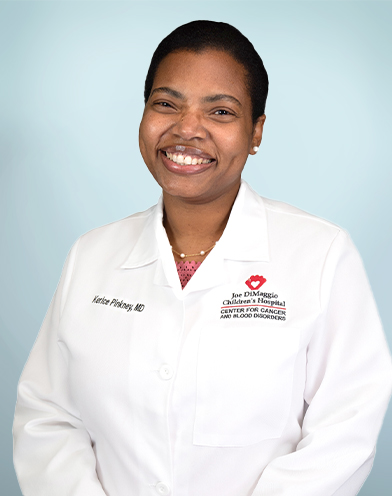How to Talk to Your Child About Their Cancer
April 17, 2023

Explaining cancer and cancer treatment to your child may seem like an impossible task. But the team at Joe DiMaggio Children’s Hospital is here to support you.
“Supporting kids with cancer is a team effort,” says Kerice Pinkney, MD, a pediatric oncologist at Joe DiMaggio Children’s Hospital. “You cannot, as a parent, manage this on your own. So we are here to help you.”
Dr. Pinkney has helped guide many families through the first conversation about a cancer diagnosis. She offers this advice to parents starting the cancer journey with their child.
Trust Your Parental Instinct
Before we talk to your child about their diagnosis, our physicians will speak with you first. We will likely take you to a separate room from your child’s so that you have space to process the information. When you are ready, we will go back to your child’s room. We encourage you to take the lead on how the conversation will go.
“Each situation is very different,” says Dr. Pinkney. “Each child and family is different. But, usually, parents know the best way to begin this conversation with their child.”
You can choose to tell your child on your own, or you can ask our team to talk to your child with you in the room. What’s important is that your child knows what is happening, which can take away the fear of the unknown. They need to understand why they are in the hospital and why they are getting certain tests and treatments.
Your child’s siblings will also need to understand what is happening. Cancer affects the whole family, and they’ll quickly notice that something important — and maybe even scary — is happening. So you should tell your child’s siblings soon after you learn about the cancer.
Talk About Cancer on Your Child’s Level
How you talk about cancer with your child can be very different depending on their age. For younger children, you may simply say that we have found something that is making them sick, so we are going to try to get rid of it. For a teenager, you’ll be more specific about what type of cancer they have and what treatments they’ll get. If you aren’t sure how to explain it to your child, we will be there to help you.
“Our wonderful child life team is exceptional in terms of support,” says Dr. Pinkney. “They have dolls with ports or PICC lines, similar to the ones your child will have, and can explain what is going to happen in language your child will understand. Communication is so important to provide your child comfort as they go through this process.”
We also encourage you to emphasize that you’ll be there to help your child feel better. You can explain how the doctors and nurses are there to help, too.
Answer Your Child’s Questions About Cancer Honestly
It can be hard to predict what questions your child will have about their cancer and cancer treatment. But being prepared to answer them honestly is important. Dr. Pinkney has often seen kids ask questions such as:
- Is my cancer contagious?
- Can I still see my friends?
- Will I lose my hair?
- Am I going to die?
- Will I get to go to school?
- Can I still play sports?
Throughout your child’s cancer journey, you should check in with them to see if they have any questions or worries.
“Let your child lead you in the conversation,” says Dr. Pinkney. “No matter what they ask, you should be honest. Do not mislead your child, no matter how tempting it may be. They need to know that no matter what, you’re going to be honest with them.”
Children fear what they don’t understand or don’t know. Honesty helps take away some fear and anxiety. And if you don’t know the answer, you can tell your child you don’t know, but will find out from the doctors.
Use All Your Cancer Resources
Joe DiMaggio Children's Hospital has many resources to support you and your family throughout your child’s cancer treatment, and encourage you to use them, such as:
- Child life team members who can explain cancer treatment and provide activities for your child
- A nurse navigator who can help keep your child’s care organized
- A pharmacy team that will explain your child’s medicines and side effects
- Social workers to help with family medical leave and emotional well-being
- A psychology team
- Support groups for children, parents and siblings
All of these resources are free and available to your family at any time in your child’s cancer treatment.
At Joe DiMaggio Children’s Hospital, our cancer care team provides compassionate support for the entire family. Learn more about our pediatric cancer services.

